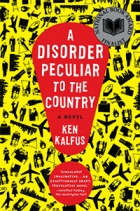A Disorder Peculiar to the Country
Joyce and Marshall each think the other is killed on September 11 - and must swallow their disappointment when the other arrives home. As their bitter divorce is further complicated by anthrax scares, suicide bombs, and foreign wars, they suffer, in ways unexpectedly personal and increasingly ludicrous, the many strange ravages of our time.
- Finalist, National Book Award
- Best of 2006: Salon, Fresh Air, Seattle Times, San Diego Union-Tribune
"Through the interbleeding of public and private story lines and his lampooning approach, Kalfus has an evident mission: freeing the way we think about Sept. 11 and the war on terror from a ready-made mold, the rigid cast of a hardening historical view. If hyperbole can be weaponized anywhere in literature, it is here. Do the destructions of a home and the homeland bear similarity? Joyce, resenting her former belief that the country was protectively isolated, thinks, 'Someone had lied to them as shamelessly as a spouse.'"
— Art Winslow, The Los Angeles Times
"Kalfus skewers the pieties surrounding 9/11, but, having set his black comedy in the shadow of that national trauma, he reverently charts the powerful sway that world events briefly held over the lives of individual Americans. "
— The New Yorker (review)
"Without giving away the many things that happen in the book's closing pages, it betrays no secret to report that Joyce and Marshall don't reconcile. Kalfus is wise as well as smart, and he knows that's not the way the world works, at least not this world. But he grants a small measure of surcease to these two troubled people, with implications for the rest of us that the reader can contemplate with pleasure and relief as this pungent yet oddly lovely novel comes to its end."
— Jonathan Yardley, The Washington Post ("The War at Home")
"Kalfus avoids the easier targets and more obvious ironies of the era.... Joyce and Marshall see their escalating conflict not so much a metaphor for the global political situation as a mirror of it, which Kalfus presents both as an indictment of their boundless narcissism, and possible explanation of it. When Joyce wonders if their marriage 'had been destroyed by chance, by external events and fortuities that had reconfigured their personalities and made them profoundly, ridiculously, disgustingly incompatible,' it is, of course the most solipsistic sort of rationalization. Yet it's also plausible that the two would act out their anxieties of the evening news in the same way their children play "9/11" and draw pictures of bodies falling from flaming buildings.'"
— Jennie Yabroff, Newsday ("Terror on the Home Front")
The New York Times Book Review
Salon
Time Out New York
San Diego Union-Tribune
Denver Post
Boston Globe
San Francisco Chronicle
Seattle Times
Bloomberg
Pittsburgh Tribune Review
Commentary
Harvard Crimson
The Notre Dame Review
Financial Times
The Telegraph, review by Toby Lichtig, review by Alastair Sooke
Times Literary Supplement
Le Figaro Littéraire
Corriere della Serra
Letras Libras
Dziennik Polska Europa Sviat














